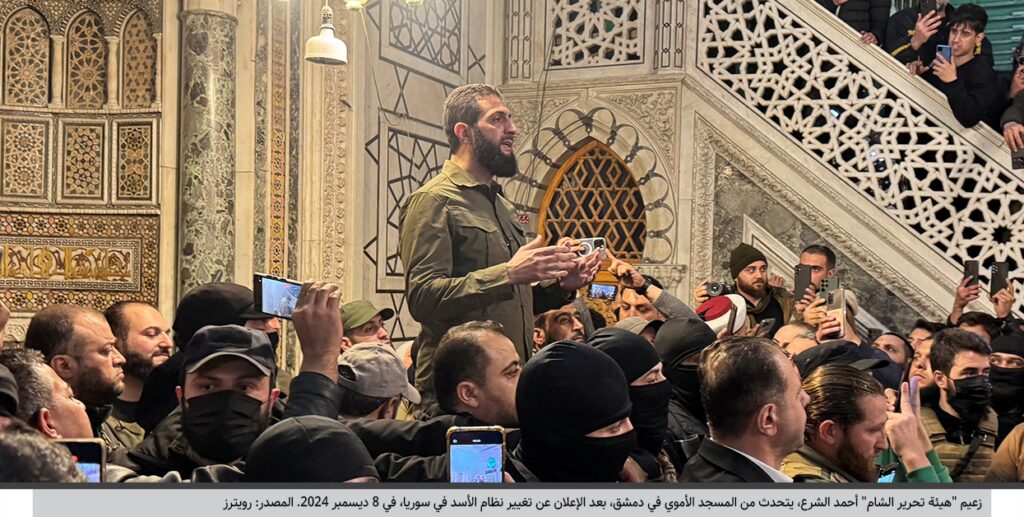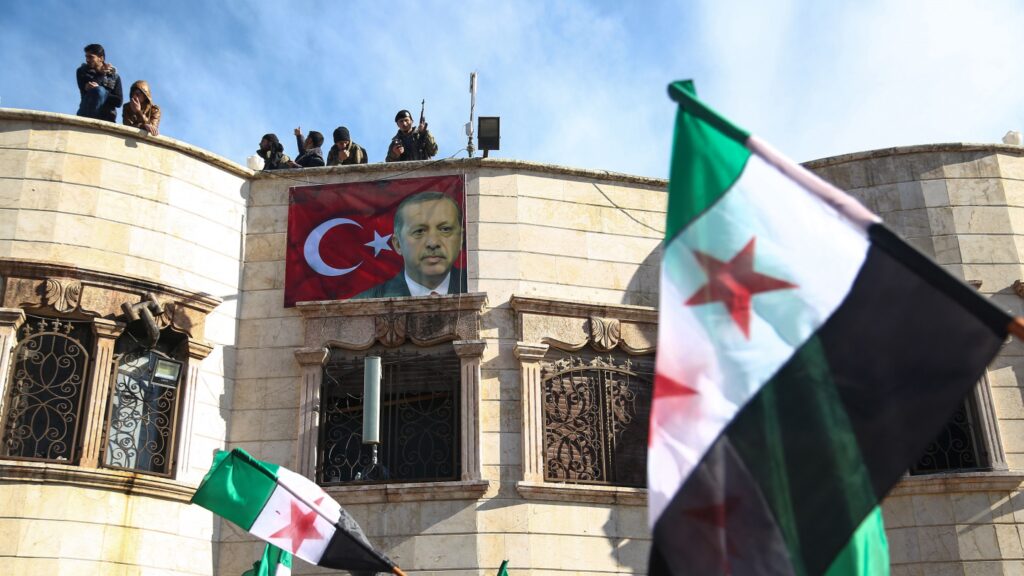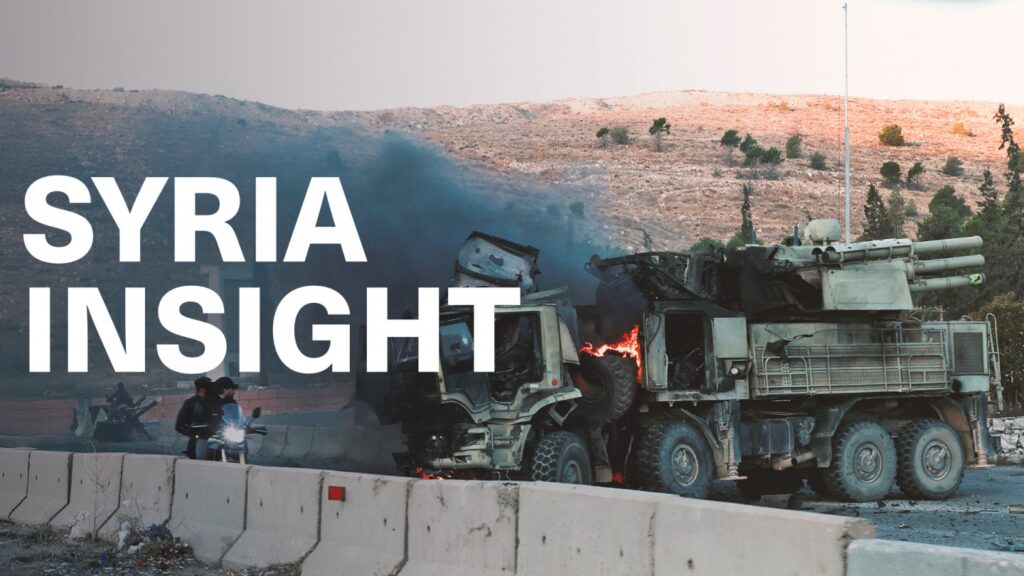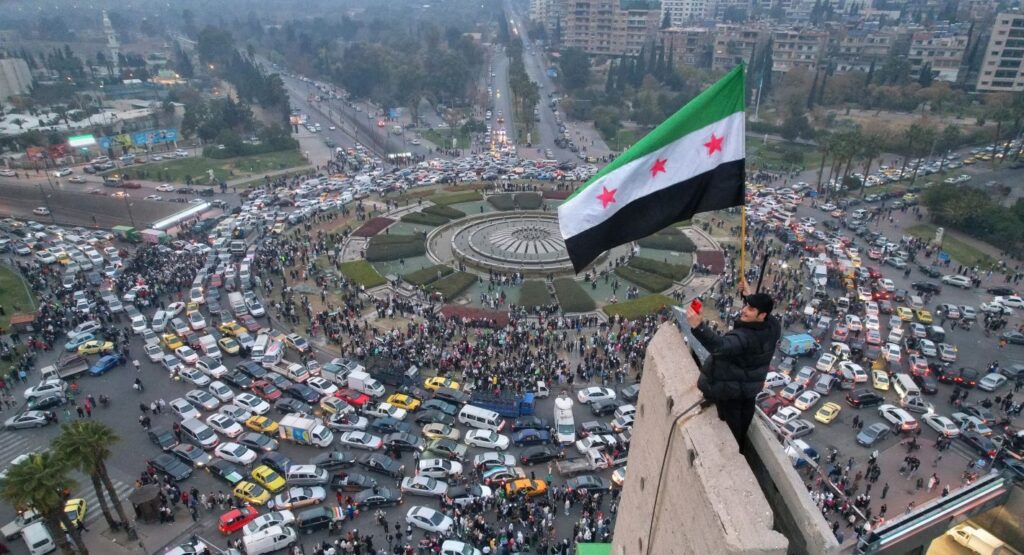Les «faiseurs de roi» tirent une nouvelle fois le tapis de la Syrie… Une «tragédie grecque» commence

La Syrie a été désintégrée et pillée au nom de la «libération» des Syriens de la menace de l’ISIS, qu’ils – Washington – avaient installé en premier lieu.
James Jeffrey, ancien ambassadeur des États-Unis en Irak et en Turquie, dans une interview accordée à PBS Frontline en mars 2021, a présenté très clairement le modèle de ce qui vient de se produire en Syrie ce mois-ci :
«La Syrie, compte tenu de sa taille, de sa situation stratégique et de son importance historique, est le pivot d’un système de sécurité géré par les États-Unis dans la région… Il y a donc cette alliance générale qui est verrouillée avec nous. Mais… c’est en Syrie que la tension est la plus forte».
Jeffrey a expliqué (dans l’interview de 2021) pourquoi les États-Unis ont réorienté leur soutien vers Al-Joulani et Hayat Tahrir al-Cham (HTS) :
«Nous avons obtenu de Mike Pompeo qu’il délivre une dérogation pour nous permettre d’aider HTS – j’ai reçu et envoyé des messages à HTS» – Les messages renvoyés par HTS étaient les suivants : «Nous [HTS] voulons être vos amis. Nous ne sommes pas des terroristes. Nous ne faisons que combattre Assad».
L’intervieweur de PBS Frontline pose la question suivante : Les États-Unis «soutiennent indirectement l’opposition armée» ? Ce à quoi Jeffrey répond :
«Il était important pour nous que HTS ne se désintègre pas … notre politique était … était de laisser HTS tranquille … Et le fait que nous n’ayons jamais ciblé [HTS], le fait que nous n’ayons jamais élevé la voix auprès des Turcs au sujet de leur cohabitation avec eux – en fait, j’ai utilisé cet exemple la dernière fois que j’ai parlé à des Turcs de très haut rang – quand ils ont commencé à se plaindre de cette relation que nous [les États-Unis] avons avec les FDS [dans l’est de la Syrie]».
«Je leur ai dit : «Écoutez, la Turquie a toujours soutenu que vous nous vouliez dans le nord-est de la Syrie, ce qui est le cas. Mais vous ne comprenez pas. Nous ne pouvons pas être dans le nord-est de la Syrie sans la plateforme, parce que nous n’avons que quelques centaines de soldats là-bas» ; … J’ai dit : «C’est comme vous à Idlib…»».
«Nous voulons que vous soyez à Idlib, mais vous ne pouvez pas être à Idlib sans avoir une plateforme, et cette plateforme est en grande partie HTS. Or, contrairement aux FDS, HTS est une organisation terroriste officielle désignée par les Nations unies. Est-ce que je me suis déjà plaint, ou est-ce qu’un responsable américain s’est déjà plaint de ce que vous faites avec HTS ? Non…».
David Miller, un universitaire britannique, a noté qu’en 2015, un éminent érudit musulman sunnite syrien, Shaykh al-Yaqoubi (qui est anti-Assad), n’a pas été convaincu par les efforts de Joulani pour donner une nouvelle image d’Al-Qaïda sous le nom de Jabhat al-Nosra. Dans l’interview qu’il a accordée à Al-Jazeera en 2013, Al-Joulani a confirmé à deux reprises son allégeance à Al-Qaïda, déclarant qu’il avait reçu des ordres de son chef, le Dr Ayman [al-Zawahiri] et que ces ordres consistaient à ne pas prendre l’Occident pour cible. Il a confirmé que sa propre position était celle d’une intolérance dure à l’égard de ceux qui pratiquaient un islam «hérétique».
Miller commente :
«Alors qu’ISIS a enfilé des costumes ; a permis à la Syrie d’être découpée par les États-Unis ; prêche la paix avec l’État sioniste ; veut des marchés libres ; et conclut des accords gaziers avec leurs patrons régionaux – leurs «vrais croyants» … dans la diaspora identitaire sunnite n’ont pas encore réalisé qu’ils ont été vendus – comme cela a toujours été le plan».
«En privé, les planificateurs de cette guerre dans les États de l’OTAN rient d’envoyer dans un hachoir à viande de la jeune chair à canon salafiste du monde entier. Les salaires de 2000 dollars ne sont qu’un grain de sable comparé à la richesse en gaz et en construction qui devrait revenir dans les coffres turcs, qataris, israéliens et américains. Ils ont tué la Palestine pour cela, et ils passeront les 30 prochaines années à le justifier, en se basant sur n’importe quel discours que les très coûteuses sociétés de relations publiques engagées par l’OTAN et les États du Golfe leur feront miroiter… L’opération de changement de régime en Syrie est le coup d’éclat du siècle».
Bien entendu, le récit de James Jeffrey n’est pas nouveau. Entre 1979 et 1992, la CIA a dépensé des milliards de dollars pour financer, armer et entraîner les milices moudjahidines afghanes (comme Oussama ben Laden) dans le but de saigner l’URSS à blanc en l’entraînant dans un bourbier. C’est dans les rangs des moudjahidines qu’Al-Qaida a vu le jour.
«Et pourtant, dans les années 2010, alors même que les États-Unis étaient ostensiblement en guerre contre Al-Qaïda en Irak et en Afghanistan, ils travaillaient secrètement avec lui en Syrie sur un plan visant à renverser Assad. La CIA a dépensé environ un milliard de dollars par an pour former et armer un vaste réseau de groupes rebelles à cette fin. Comme Jake Sullivan, l’a dit à la secrétaire d’État Hillary Clinton dans un courriel divulgué en 2012, «AQ [al-Qaïda] est de notre côté en Syrie»», comme l’observe Alan Macleod dans Consortium News.
Les comptes rendus de la presse turque confirment largement que ce scénario de Jeffrey était le plan de match actuel : Ömer Önhon, ancien ambassadeur principal et sous-secrétaire adjoint chargé du Moyen-Orient et de l’Asie au ministère des Affaires étrangères turc, écrit que :
«L’opération visant à renverser le régime d’Assad en Syrie a été méticuleusement planifiée pendant plus d’un an, avec la participation coordonnée de la Turquie, des États-Unis et de plusieurs autres pays. À travers diverses déclarations, il est apparu clairement que le départ d’Assad résultait d’un réseau complexe d’accords entre pratiquement toutes les parties prenantes. Alors que HTS travaille activement à se donner une nouvelle image, cette transformation reste à prouver».
Cette histoire de HTS a un précédent : Au cours de l’été qui a suivi la guerre (infructueuse) d’Israël contre le Hezbollah en 2006, Dick Cheney était assis dans son bureau et déplorait bruyamment la force persistante du Hezbollah ; pire encore, il lui semblait que l’Iran avait été le principal bénéficiaire de la guerre d’Irak menée par les États-Unis en 2003.
L’invité de Cheney, le prince Bandar, alors chef des services de renseignement saoudiens, a vigoureusement abondé dans son sens (comme l’a relaté John Hannah, qui a participé à la réunion) et, à la surprise générale, le prince Bandar a proclamé que l’Iran pouvait encore être réduit à sa portion congrue : La Syrie était le maillon «faible» qui pouvait s’effondrer par le biais d’une insurrection islamiste. Le scepticisme initial de Cheney s’est transformé en exaltation lorsque Bandar a déclaré que l’implication des États-Unis pourrait être inutile. Il – Bandar – orchestrerait et gérerait le projet : «Laissez-moi faire», a-t-il dit. Bandar a déclaré séparément à John Hannah : «Le roi sait qu’à part l’effondrement de la République islamique elle-même, rien n’affaiblirait plus l’Iran que la perte de la Syrie».
Cette première tentative n’a pas été couronnée de succès. Elle a conduit à une guerre civile sanglante, mais le gouvernement du président Assad a finalement survécu.
Ainsi, Jeffrey ne faisait que réitérer en 202 sa suite : le «tirage de tapis» original sur la Syrie par les wahhabites du Golfe devait simplement être transformé en un coup de HTS par un amalgame rebaptisé de diverses milices composées principalement d’anciens combattants (dont beaucoup n’étaient pas syriens) d’Al-Qaïda/al-Nosra et d’ISIS, dirigées – dans cette deuxième itération – par les services de renseignement turcs et financées par le Qatar.
La Syrie a donc été désintégrée et pillée au nom de la «libération» des Syriens de la menace d’ISIS, qu’ils – Washington – avaient installé en premier lieu, et que les États-Unis ont ensuite utilisé pour justifier l’occupation du nord-est de la Syrie par les forces américaines. Sur le même mode, le non-dit de ce plan est de rendre la Syrie laïque – avec son système juridique emprunté à la France – «islamique» («nous mettrons en œuvre la loi islamique») pour justifier les attaques israéliennes et les accaparements de terres, qui sont présentés comme des «mesures défensives contre les djihadistes».
Bien sûr, il est exact qu’il y a probablement de l’argent à gagner avec ces événements. Cela n’a jamais été prouvé, mais les études sismiques réalisées avant le début de la première guerre en Syrie, en 2011, semblaient montrer qu’il pourrait bien y avoir des gisements de pétrole ou de gaz en Syrie, au-delà des gisements relativement petits du nord-est. Et oui, la reconstruction sera une aubaine pour le secteur de la construction turc, en perte de vitesse.
L’armée syrienne en difficulté ne constitue pas une menace militaire directe pour Israël. On peut donc se demander pourquoi ils démolissent la région. «L’objectif d’Israël est de détruire la Syrie», estime le professeur Mearsheimer. «Ce n’est pas en grande partie à cause d’Israël, d’ailleurs. Je pense que les Américains et les Turcs ont joué un rôle beaucoup plus important qu’Israël dans la destruction de la Syrie». «Le pays est détruit et je ne connais personne qui pense que les rebelles qui contrôlent aujourd’hui Damas vont pouvoir rétablir l’ordre dans ce pays… Du point de vue d’Israël, la situation est tout à fait satisfaisante», ajoute Mearsheimer.
Les faucons anti-russes américains espéraient également que la Russie pourrait profiter de l’appât d’une Syrie en ruine pour s’enliser dans un bourbier de plus en plus grand au Moyen-Orient.
Tout cela nous ramène directement à la déclaration de Jeffrey : «La Syrie, compte tenu de sa taille, de sa situation stratégique et de son importance historique, est le pivot de la mise en place d’un système de sécurité géré par les Américains dans la région…».
La Syrie a été dès le départ – à partir de 1949 – «l’équilibriste» d’Israël dans la région. Ce rôle est désormais révolu et il ne reste plus que l’Iran pour contrebalancer la poussée israélienne vers un «Grand Israël». Il n’est donc pas surprenant que les Israéliens s’agitent pour que les Américains se joignent à eux dans une nouvelle orgie de destruction, cette fois à l’encontre de l’Iran.
La Russie avait-elle connaissance de ce qui se préparait à Idlib et de l’orchestration d’une transition de pouvoir ? Bien sûr ! Les très efficaces services russes devaient être au courant, car ce projet sur la Syrie est en cours depuis le milieu des années 1970 (par l’intermédiaire de l’Institut Hudson et du sénateur Scoop Jackson).
Au cours des quatre dernières années, Assad a fait part de son plan désespéré avec l’Arabie saoudite, les Émirats arabes unis et l’Égypte pour s’orienter vers une position plus pro-israélienne/pro-occidentale, dans l’espoir de se normaliser avec Washington et d’obtenir ainsi un allègement des sanctions.
Le stratagème d’Assad a échoué – et la Syrie émergera probablement comme une «tragédie grecque», où la tragédie évolue au fur et à mesure que les acteurs jouent leur propre nature. Les tensions ethniques et sectaires latentes vont probablement se raviver, les incendies vont se propager. Le couvercle est ouvert. Et la Russie n’allait jamais mordre à l’hameçon en se lançant dans l’aventure.
L’alliance américano-israélienne veut depuis longtemps la Syrie. Et maintenant, ils l’ont. C’est à eux qu’incombe la responsabilité de tout désordre concomitant. Oui, les États-Unis – en théorie – peuvent se féliciter d’avoir mis en place un «système de sécurité [et de flux d’énergie dominant] géré par les Américains».
Mais les strates dirigeantes américaines n’allaient jamais laisser l’Europe devenir indépendante sur le plan énergétique. Les États-Unis ont besoin des actifs énergétiques du Moyen-Orient pour eux-mêmes – pour garantir leur surendettement. Les États européens sont laissés à l’abandon, alors que la crise budgétaire se fait sentir et que la croissance européenne s’essouffle.
D’autres pourraient y voir un scénario collatéral, à savoir qu’un Moyen-Orient en conflit, voire à nouveau radicalisé, aggraverait les tensions sociales internes déjà «vives» en Europe.
Quoi qu’il en soit, Israël savoure sa «victoire». Gagner quoi ? L’ancien chef d’état-major des forces de défense israéliennes et ministre de la Défense «Bogie» Ya’alon l’explique ainsi :
«La voie suivie par le gouvernement israélien actuel est de conquérir, d’annexer, de commettre un nettoyage ethnique… et d’établir des colonies juives. Les sondages montrent qu’environ 70 % des Israéliens, parfois plus, soutiennent cette démarche – ET qu’Israël est une démocratie libérale».
«Cette voie [contradictoire] nous mènera à la destruction», conclut-il.
Quelle autre issue peut être trouvée à ce projet sioniste ? Il y a plus de sept millions de Palestiniens entre le «fleuve et la mer». Vont-ils tous disparaître de la carte ?







